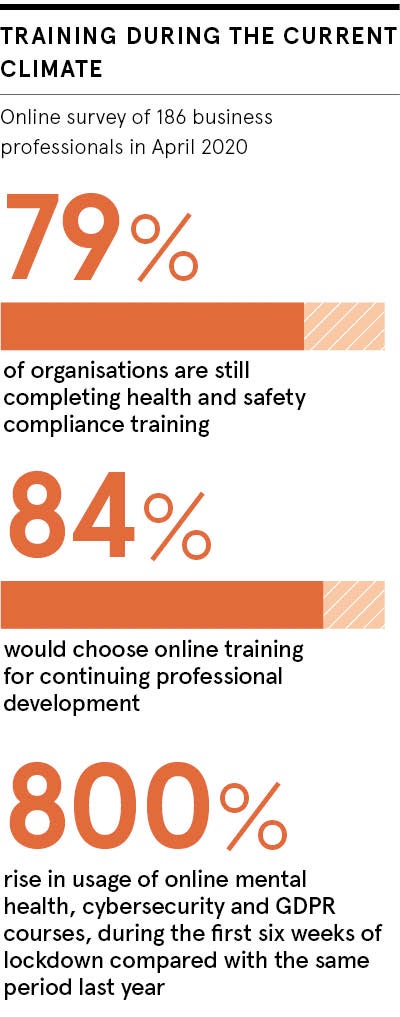With no access to face-to-face training, dispersed workforces have shifted their attention to the web, with health, safety and wellbeing courses topping the agenda. As businesses return to work, this trend is set to continue.
“Right now, it’s even more crucial that employers put people first. During this crisis keeping workers informed and educated on how to deal with this unprecedented situation has been crucial. Organisations have had to weather this storm and face many challenges while adjusting to a new normal,” explains Nathan Pitman, director at iHASCO, a market-leading provider of e-learning, which works with more than 10,000 UK businesses.
“Businesses have always had a responsibility to provide workplace training, but we’ve seen many clients go above and beyond for their staff in this pandemic, even training furloughed workers and keeping their knowledge up to date. E-learning is now much more accessible because we’ve invested so much in making our platform as user friendly as possible, catering to those whose first language is not English, providing closed captions for those who are hard of hearing and compatibility with screen readers for those with visual impairments.”

Some organisations have used e-learning as an opportunity to prepare employees for a return to work. For others it has been about providing essential continual professional development or a way of keeping workers socially distanced, yet still keeping their training on track.
For instance, the care home sector has used online training modules to avoid face-to-face contact, a crucial move during this period. At the same time, those in the hospitality industry have used lockdown to provide digital refresher courses in food safety and hygiene.
“Our mental health awareness training courses have also seen an 800 per cent rise in usage. This reflects the groundswell in support for this issue, especially during these difficult times. We’ve also seen an explosion in e-learning for cybersecurity and GDPR, the EU’s data protection regulation, with so many employees working from home and the risks it creates,” says Pitman, whose company has delivered more than five million online training sessions to the likes of Avon Cosmetics and Renault Retail Group UK.
“Companies have been looking for reliable ways to navigate and support their staff through this pandemic. The businesses that will now thrive as the economy opens up will be those that are agile and are able to react quickly. E-learning can make a difference to the safety and wellbeing of employees; it can also boost productivity, reduce absenteeism and create confidence in your workforce.”
It helps that there’s been a gradual move away from online training as a box-ticking exercise, especially when it focuses on health and safety. Courses are now taken a lot more seriously by both the employer and employee. E-learning has become more engaging and direct, which has in turn promoted an increase in recall.
“This is why we have dedicated scriptwriters and creative teams who work hard to make our courses appealing and truly engaging. It’s so important for people to have a good understanding of abstract and complex issues such as mental health. We use a subtle interplay of presenter-led footage, motion graphics and location-based video scenarios to tell a story in our courses. It makes for a more engaging and memorable learning experience,” says Pitman.
“Looking to the future, a return to pre-COVID times is unlikely. As flexi-working becomes the norm, e-learning provides an easy solution to support the whole workforce. While employers now have a renewed focus on taking employee engagement and wellbeing more seriously, employees rightly want to feel safe and secure at work. We believe e-learning can make a genuine difference and provide businesses with the strong, resilient workforce they need to survive and prosper.”
Try any iHASCO courses for free at www.ihasco.co.uk

